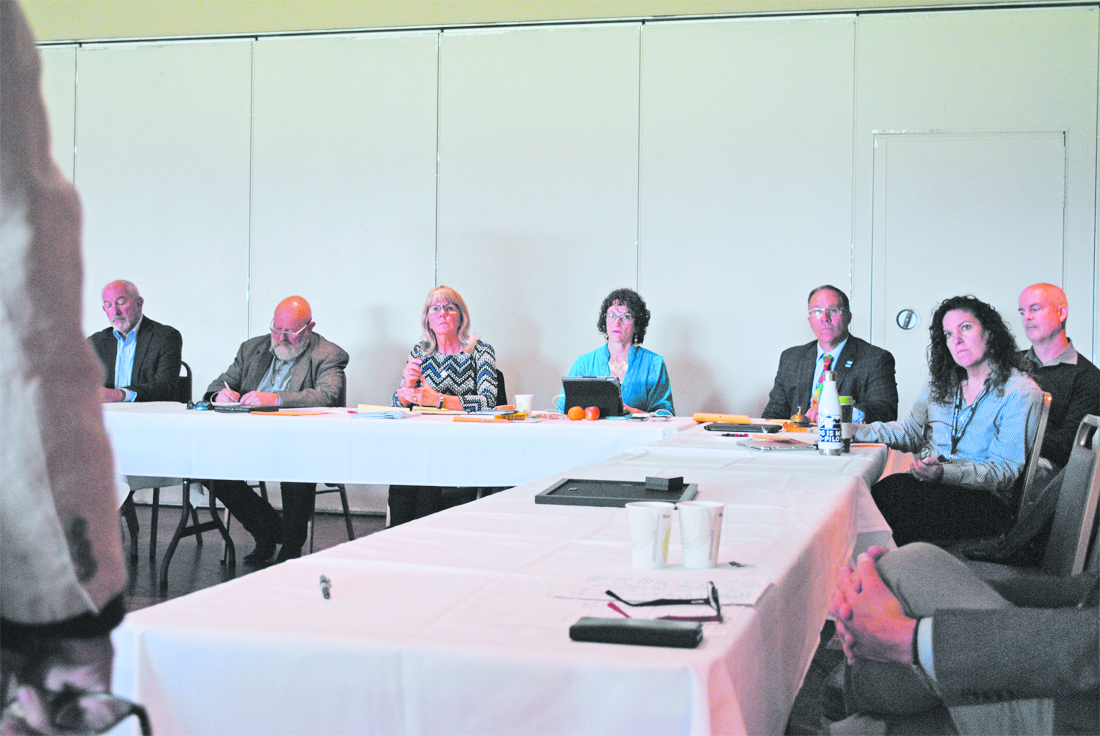
Photo by Andre Byik
The Butte County Board of Supervisors explored governance challenges and priorities for the next two years Tuesday (Dec. 10) at the Chico Elks Lodge.
Grievances between members of the Board of Supervisors surfaced Tuesday (Dec. 10) at an hours-long public workshop focused on governance and priorities.
In a contentious exchange apparently alluding to the board’s decision to de-fund a feasibility study of a proposed water pipeline from Paradise to Chico, Supervisor Bill Connelly suggested one of his colleagues, Supervisor Debra Lucero, come better prepared to board meetings and seek out relevant information before it becomes time to address items placed on the board’s agendas.
“So, don’t ask questions if you could call and ask before the meeting, or go take a class or do something,” he said. “You just can’t play to the camera.”
“Go take a class or do something?” Lucero replied. “Play to the camera? Oh, boy. Wow.”
She later added that she found offensive the suggestion that she comes to meetings unprepared.
“I really take this stuff seriously,” she said. “And I do a lot of homework, and I talk to a lot of people.”
Connelly’s barb—one of several pointed exchanges that took place between board members during the four-hour workshop at the Chico Elks Lodge—illustrated the divide in governance methods between first-term Supervisors Lucero and Tami Ritter, and multiterm Supervisors Connelly, Steve Lambert and Doug Teeter.
The workshop, which was moderated by Bill Chiat, dean of the California State Association of Counties Institute for Excellence in County Government, began with a public comment period that featured more than a dozen speakers expressing their displeasure with recent tree-trimming activities and practices along Bidwell Avenue in unincorporated west Chico.
Lambert, chairman of the board, pointed to the roughly 50-minute comment period as an example of the contrast between Lucero’s approach and his own. It’s about time management, Lambert said, noting that he doesn’t encourage his constituents to show up to board meetings en masse.
“I think where we have a downside—for me—during meetings is when we have 27 people show up to say the same thing,” Lambert said. “I could have … 1,300 farmers come here for every meeting [and] complain about something that the county did. … I say, ‘No, I’ll take care of that. I hear your point. I hear your problem. I will make sure that that is addressed.’”
Speaking to the tree-trimming issue, Lucero noted a previous attempt at establishing an ordinance to protect certain trees was shot down by Chief Administrative Officer Shari McCracken, who said there was not enough time to explore the issue before the end of the year. Lucero, whose district encompasses the west Chico neighborhood, implied she’d had trouble getting answers from staff related to questions about tree-trimming notice and permitting processes. Once she began receiving calls about the recent tree work, she said, there was little she could do but suggest her constituents attend the next board meeting.
Ritter, a former member of the Chico City Council, seized upon that sentiment, saying she’s found that people want to be heard, and board meetings are one of the few places where they have the opportunity to address a public representative.
Later in the workshop, when the county’s department heads took turns addressing the challenges they continue to grapple with in a post-Camp Fire landscape, some consensus emerged. In the next two years, the supervisors said the county must prioritize mental health services for county employees; housing availability and costs; technology and customer service; and fire risk mitigation and water policies.
County water issues and priorities, it was noted, would be addressed at a workshop scheduled for Tuesday (Dec. 17) at the Board of Supervisors chambers.
Paul Gosselin, the county’s director of Water and Resource Conservation, offered a preview of the upcoming water workshop at the Water Commission’s meeting last Wednesday (Dec. 4). The Board of Supervisors, he said, would go over county water policies developed over the last two decades, reaffirming them or offering new direction to county staff. Policies addressing groundwater sustainability, local water supplies, existing water contracts, quality and projects will be reviewed.
It’s a discussion that hasn’t been taken up by the board in about 10 years, Gosselin said, and it was spurred by the panel’s recent decision to remove the county from a study assessing the feasibility of an intertie pipeline project between the Paradise Irrigation District (PID) and California Water Service Co.’s Chico branch.
It’s unclear whether a study of a possible intertie project, which has been billed as one way to help keep PID financially viable after losing its customer base in the Camp Fire, would be addressed by the board, but Gosselin said once policies are reaffirmed or modified, he expected some discussion regarding application of those policies would take place.
Water Commissioner Matthew Tennis had drafted a resolution in support of the pipeline study, and he asked whether the document could be placed on a future Water Commission agenda as an action item. His request was rejected and described as premature by County Counsel Bruce Alpert and Chairman David Skinner.
Alpert said that the county currently has no involvement with a PID-Cal Water pipeline study, and specific projects like the intertie concept would not be considered by the Board of Supervisors until the panel affirms its water policies and goals. Taking action on a resolution before then, he said, would be a “futile act.”
Alpert further noted that there were aspects of the possible pipeline project that were being discussed without the county’s full understanding of its own potential role. PID’s attorney, he said, had talked about first selling water to the county, which would in turn sell water to Cal Water.
“Nothing like that’s ever been discussed by the board,” Alpert said. “Nothing like that’s ever been approved by the board—or considered by the board. [It] came out of the blue.”
